Understanding Relationships, Roles, and Conflict Resolution in NHS
VerifiedAdded on 2023/06/18
|10
|2649
|221
Report
AI Summary
This report provides an analysis of working and personal relationships within the health and social care sector, specifically focusing on the National Health Service (NHS). It differentiates between working and personal relationships, highlighting the importance of both in fostering a supportive environment for service users and colleagues. The report identifies various professional roles within the NHS, such as care workers, consultants, trust doctors, general practitioners, and academic doctors, emphasizing their respective responsibilities in patient care. It underscores the significance of interprofessional partnerships in ensuring effective communication and comprehensive care delivery. Furthermore, the report discusses the importance of adhering to the agreed scope of job roles to maintain accountability and prevent errors. Finally, it outlines essential skills and approaches for resolving workplace conflicts, advocating for effective communication, problem-solving, patience, a positive attitude, and active listening, along with the 5C's approach: Carefully listening, Considerately looking at the situation, Calmy understanding conflicting perspectives, Conscientiously observing the facts, and Cooperatively working together.
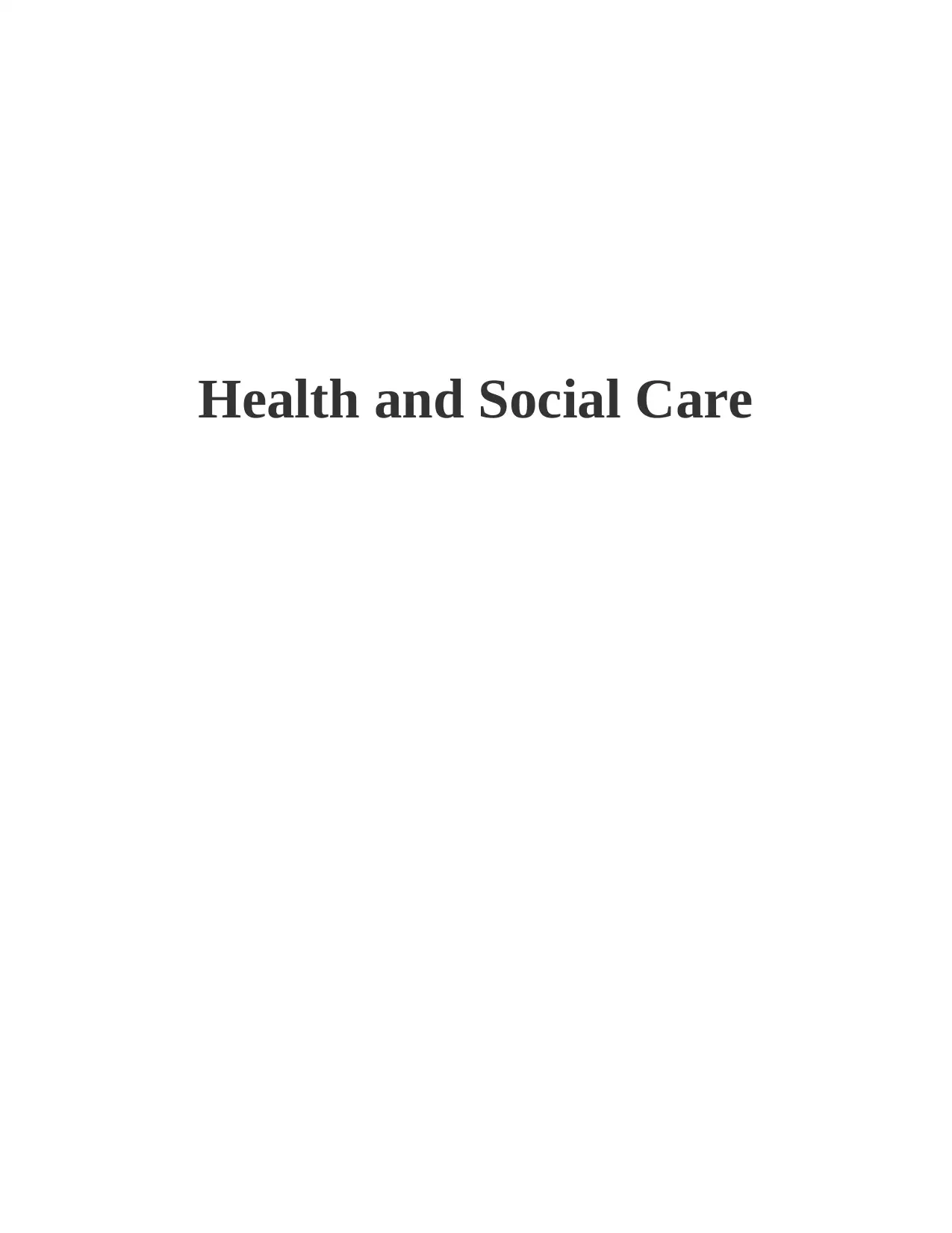
Health and Social Care
Paraphrase This Document
Need a fresh take? Get an instant paraphrase of this document with our AI Paraphraser
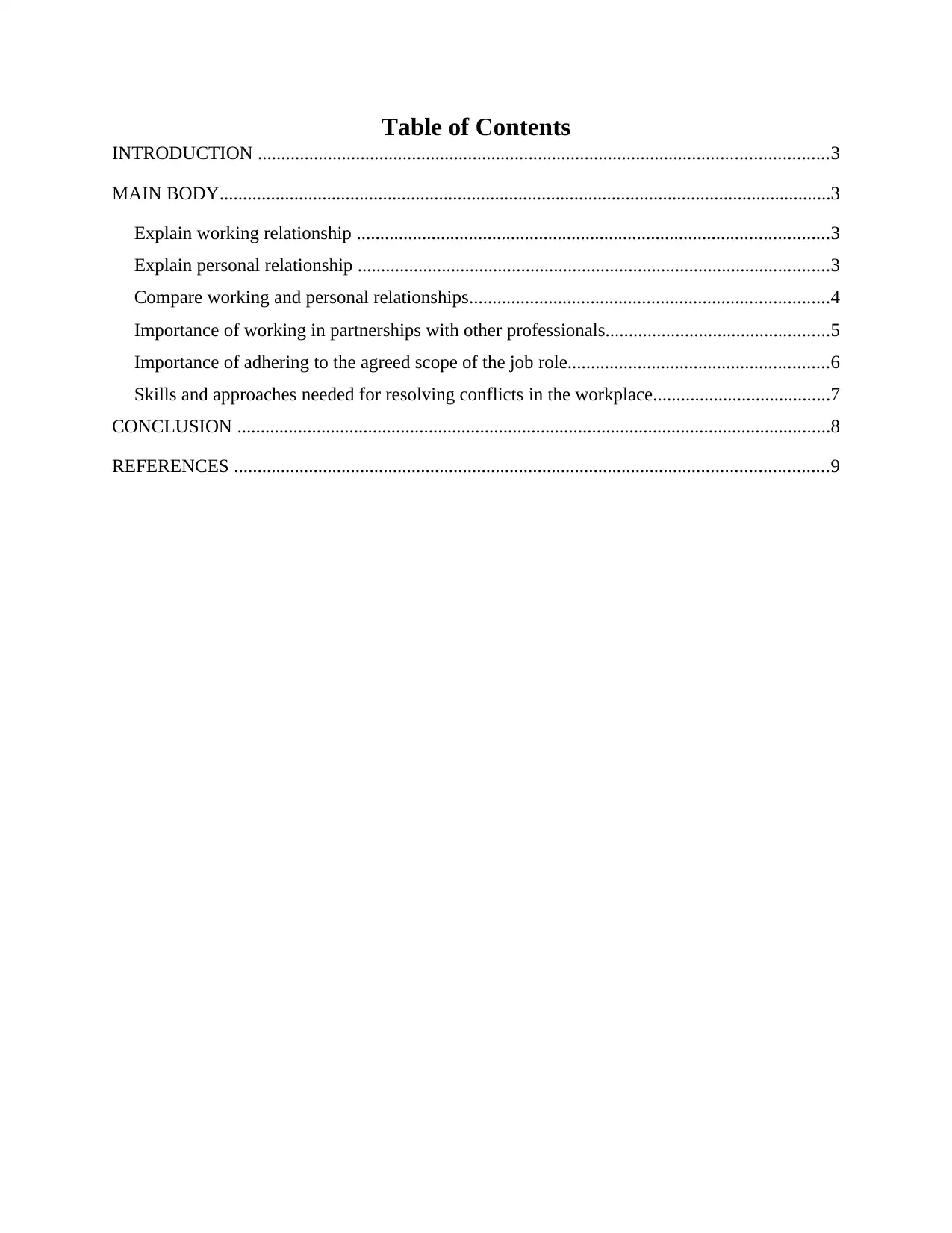
Table of Contents
INTRODUCTION ..........................................................................................................................3
MAIN BODY...................................................................................................................................3
Explain working relationship .....................................................................................................3
Explain personal relationship .....................................................................................................3
Compare working and personal relationships.............................................................................4
Importance of working in partnerships with other professionals................................................5
Importance of adhering to the agreed scope of the job role........................................................6
Skills and approaches needed for resolving conflicts in the workplace......................................7
CONCLUSION ...............................................................................................................................8
REFERENCES ...............................................................................................................................9
INTRODUCTION ..........................................................................................................................3
MAIN BODY...................................................................................................................................3
Explain working relationship .....................................................................................................3
Explain personal relationship .....................................................................................................3
Compare working and personal relationships.............................................................................4
Importance of working in partnerships with other professionals................................................5
Importance of adhering to the agreed scope of the job role........................................................6
Skills and approaches needed for resolving conflicts in the workplace......................................7
CONCLUSION ...............................................................................................................................8
REFERENCES ...............................................................................................................................9
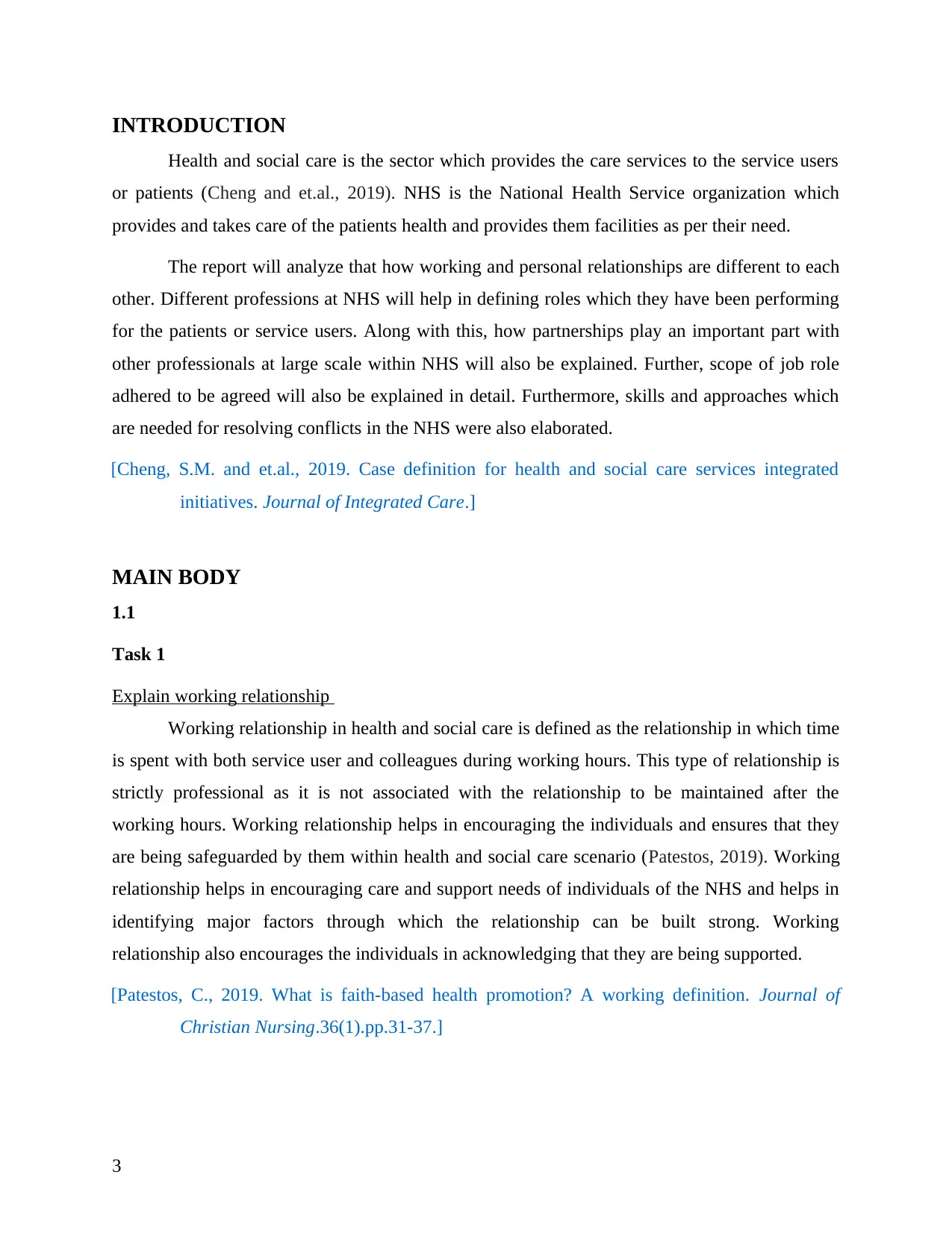
INTRODUCTION
Health and social care is the sector which provides the care services to the service users
or patients (Cheng and et.al., 2019). NHS is the National Health Service organization which
provides and takes care of the patients health and provides them facilities as per their need.
The report will analyze that how working and personal relationships are different to each
other. Different professions at NHS will help in defining roles which they have been performing
for the patients or service users. Along with this, how partnerships play an important part with
other professionals at large scale within NHS will also be explained. Further, scope of job role
adhered to be agreed will also be explained in detail. Furthermore, skills and approaches which
are needed for resolving conflicts in the NHS were also elaborated.
[Cheng, S.M. and et.al., 2019. Case definition for health and social care services integrated
initiatives. Journal of Integrated Care.]
MAIN BODY
1.1
Task 1
Explain working relationship
Working relationship in health and social care is defined as the relationship in which time
is spent with both service user and colleagues during working hours. This type of relationship is
strictly professional as it is not associated with the relationship to be maintained after the
working hours. Working relationship helps in encouraging the individuals and ensures that they
are being safeguarded by them within health and social care scenario (Patestos, 2019). Working
relationship helps in encouraging care and support needs of individuals of the NHS and helps in
identifying major factors through which the relationship can be built strong. Working
relationship also encourages the individuals in acknowledging that they are being supported.
[Patestos, C., 2019. What is faith-based health promotion? A working definition. Journal of
Christian Nursing.36(1).pp.31-37.]
3
Health and social care is the sector which provides the care services to the service users
or patients (Cheng and et.al., 2019). NHS is the National Health Service organization which
provides and takes care of the patients health and provides them facilities as per their need.
The report will analyze that how working and personal relationships are different to each
other. Different professions at NHS will help in defining roles which they have been performing
for the patients or service users. Along with this, how partnerships play an important part with
other professionals at large scale within NHS will also be explained. Further, scope of job role
adhered to be agreed will also be explained in detail. Furthermore, skills and approaches which
are needed for resolving conflicts in the NHS were also elaborated.
[Cheng, S.M. and et.al., 2019. Case definition for health and social care services integrated
initiatives. Journal of Integrated Care.]
MAIN BODY
1.1
Task 1
Explain working relationship
Working relationship in health and social care is defined as the relationship in which time
is spent with both service user and colleagues during working hours. This type of relationship is
strictly professional as it is not associated with the relationship to be maintained after the
working hours. Working relationship helps in encouraging the individuals and ensures that they
are being safeguarded by them within health and social care scenario (Patestos, 2019). Working
relationship helps in encouraging care and support needs of individuals of the NHS and helps in
identifying major factors through which the relationship can be built strong. Working
relationship also encourages the individuals in acknowledging that they are being supported.
[Patestos, C., 2019. What is faith-based health promotion? A working definition. Journal of
Christian Nursing.36(1).pp.31-37.]
3
⊘ This is a preview!⊘
Do you want full access?
Subscribe today to unlock all pages.

Trusted by 1+ million students worldwide
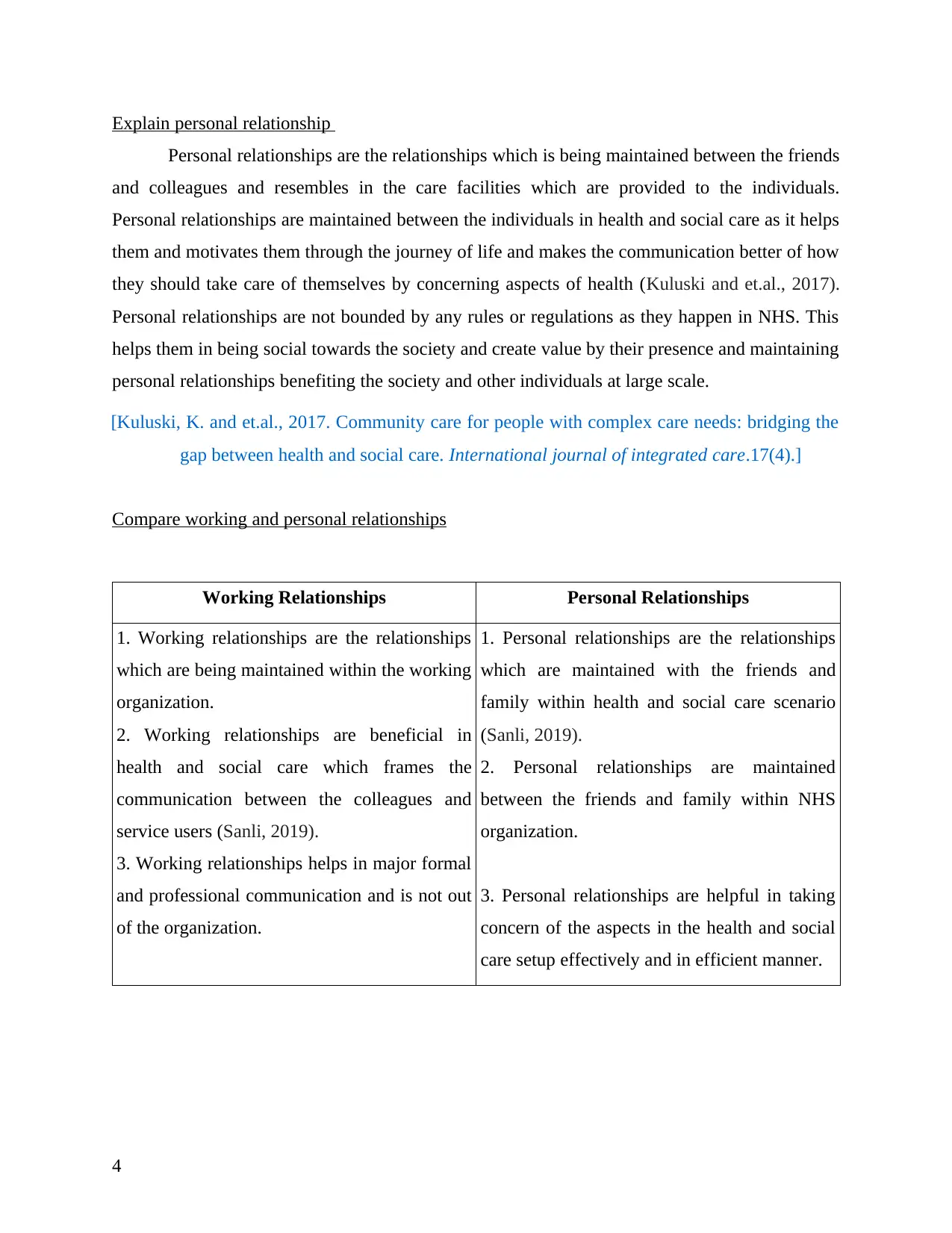
Explain personal relationship
Personal relationships are the relationships which is being maintained between the friends
and colleagues and resembles in the care facilities which are provided to the individuals.
Personal relationships are maintained between the individuals in health and social care as it helps
them and motivates them through the journey of life and makes the communication better of how
they should take care of themselves by concerning aspects of health (Kuluski and et.al., 2017).
Personal relationships are not bounded by any rules or regulations as they happen in NHS. This
helps them in being social towards the society and create value by their presence and maintaining
personal relationships benefiting the society and other individuals at large scale.
[Kuluski, K. and et.al., 2017. Community care for people with complex care needs: bridging the
gap between health and social care. International journal of integrated care.17(4).]
Compare working and personal relationships
Working Relationships Personal Relationships
1. Working relationships are the relationships
which are being maintained within the working
organization.
2. Working relationships are beneficial in
health and social care which frames the
communication between the colleagues and
service users (Sanli, 2019).
3. Working relationships helps in major formal
and professional communication and is not out
of the organization.
1. Personal relationships are the relationships
which are maintained with the friends and
family within health and social care scenario
(Sanli, 2019).
2. Personal relationships are maintained
between the friends and family within NHS
organization.
3. Personal relationships are helpful in taking
concern of the aspects in the health and social
care setup effectively and in efficient manner.
4
Personal relationships are the relationships which is being maintained between the friends
and colleagues and resembles in the care facilities which are provided to the individuals.
Personal relationships are maintained between the individuals in health and social care as it helps
them and motivates them through the journey of life and makes the communication better of how
they should take care of themselves by concerning aspects of health (Kuluski and et.al., 2017).
Personal relationships are not bounded by any rules or regulations as they happen in NHS. This
helps them in being social towards the society and create value by their presence and maintaining
personal relationships benefiting the society and other individuals at large scale.
[Kuluski, K. and et.al., 2017. Community care for people with complex care needs: bridging the
gap between health and social care. International journal of integrated care.17(4).]
Compare working and personal relationships
Working Relationships Personal Relationships
1. Working relationships are the relationships
which are being maintained within the working
organization.
2. Working relationships are beneficial in
health and social care which frames the
communication between the colleagues and
service users (Sanli, 2019).
3. Working relationships helps in major formal
and professional communication and is not out
of the organization.
1. Personal relationships are the relationships
which are maintained with the friends and
family within health and social care scenario
(Sanli, 2019).
2. Personal relationships are maintained
between the friends and family within NHS
organization.
3. Personal relationships are helpful in taking
concern of the aspects in the health and social
care setup effectively and in efficient manner.
4
Paraphrase This Document
Need a fresh take? Get an instant paraphrase of this document with our AI Paraphraser
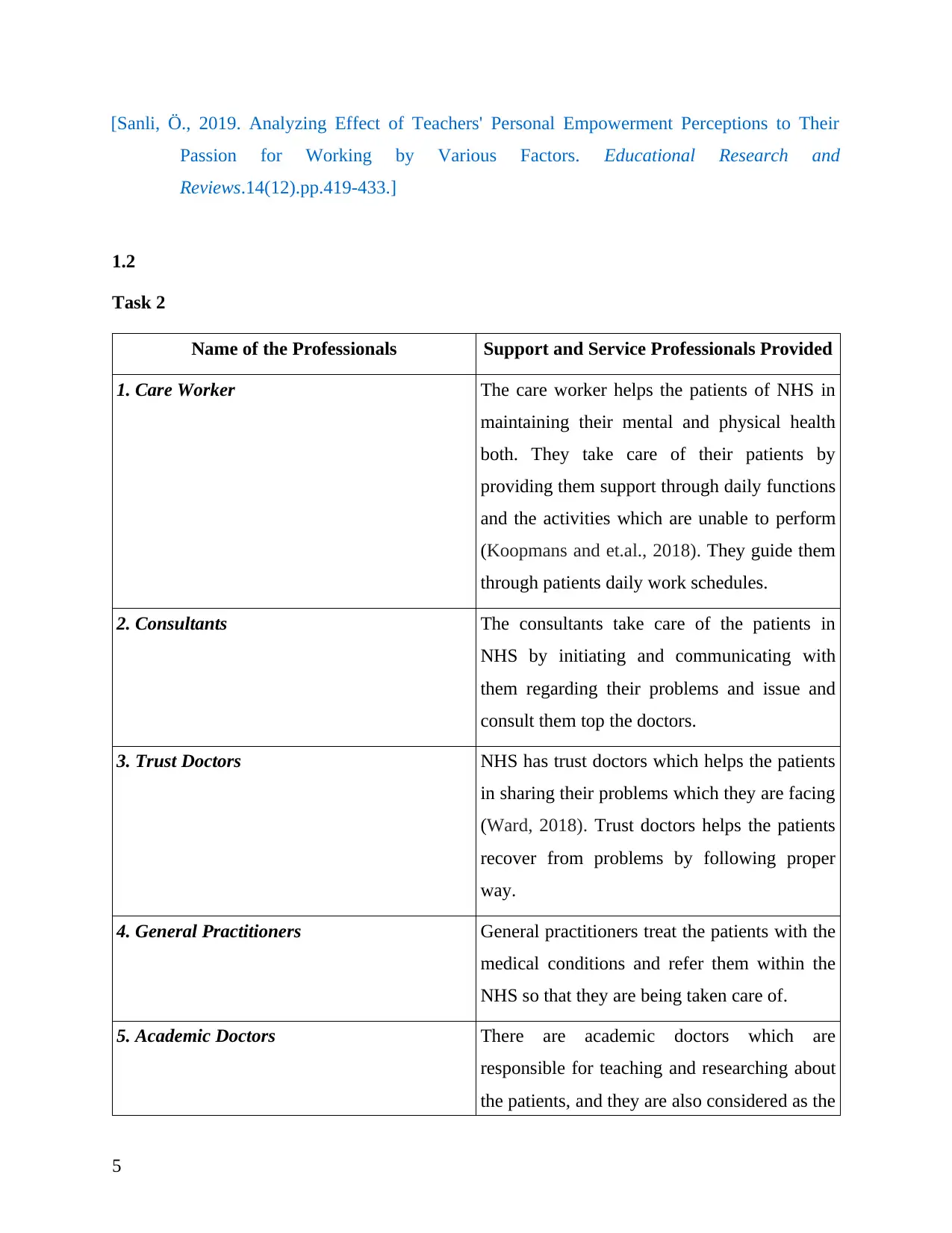
[Sanli, Ö., 2019. Analyzing Effect of Teachers' Personal Empowerment Perceptions to Their
Passion for Working by Various Factors. Educational Research and
Reviews.14(12).pp.419-433.]
1.2
Task 2
Name of the Professionals Support and Service Professionals Provided
1. Care Worker The care worker helps the patients of NHS in
maintaining their mental and physical health
both. They take care of their patients by
providing them support through daily functions
and the activities which are unable to perform
(Koopmans and et.al., 2018). They guide them
through patients daily work schedules.
2. Consultants The consultants take care of the patients in
NHS by initiating and communicating with
them regarding their problems and issue and
consult them top the doctors.
3. Trust Doctors NHS has trust doctors which helps the patients
in sharing their problems which they are facing
(Ward, 2018). Trust doctors helps the patients
recover from problems by following proper
way.
4. General Practitioners General practitioners treat the patients with the
medical conditions and refer them within the
NHS so that they are being taken care of.
5. Academic Doctors There are academic doctors which are
responsible for teaching and researching about
the patients, and they are also considered as the
5
Passion for Working by Various Factors. Educational Research and
Reviews.14(12).pp.419-433.]
1.2
Task 2
Name of the Professionals Support and Service Professionals Provided
1. Care Worker The care worker helps the patients of NHS in
maintaining their mental and physical health
both. They take care of their patients by
providing them support through daily functions
and the activities which are unable to perform
(Koopmans and et.al., 2018). They guide them
through patients daily work schedules.
2. Consultants The consultants take care of the patients in
NHS by initiating and communicating with
them regarding their problems and issue and
consult them top the doctors.
3. Trust Doctors NHS has trust doctors which helps the patients
in sharing their problems which they are facing
(Ward, 2018). Trust doctors helps the patients
recover from problems by following proper
way.
4. General Practitioners General practitioners treat the patients with the
medical conditions and refer them within the
NHS so that they are being taken care of.
5. Academic Doctors There are academic doctors which are
responsible for teaching and researching about
the patients, and they are also considered as the
5
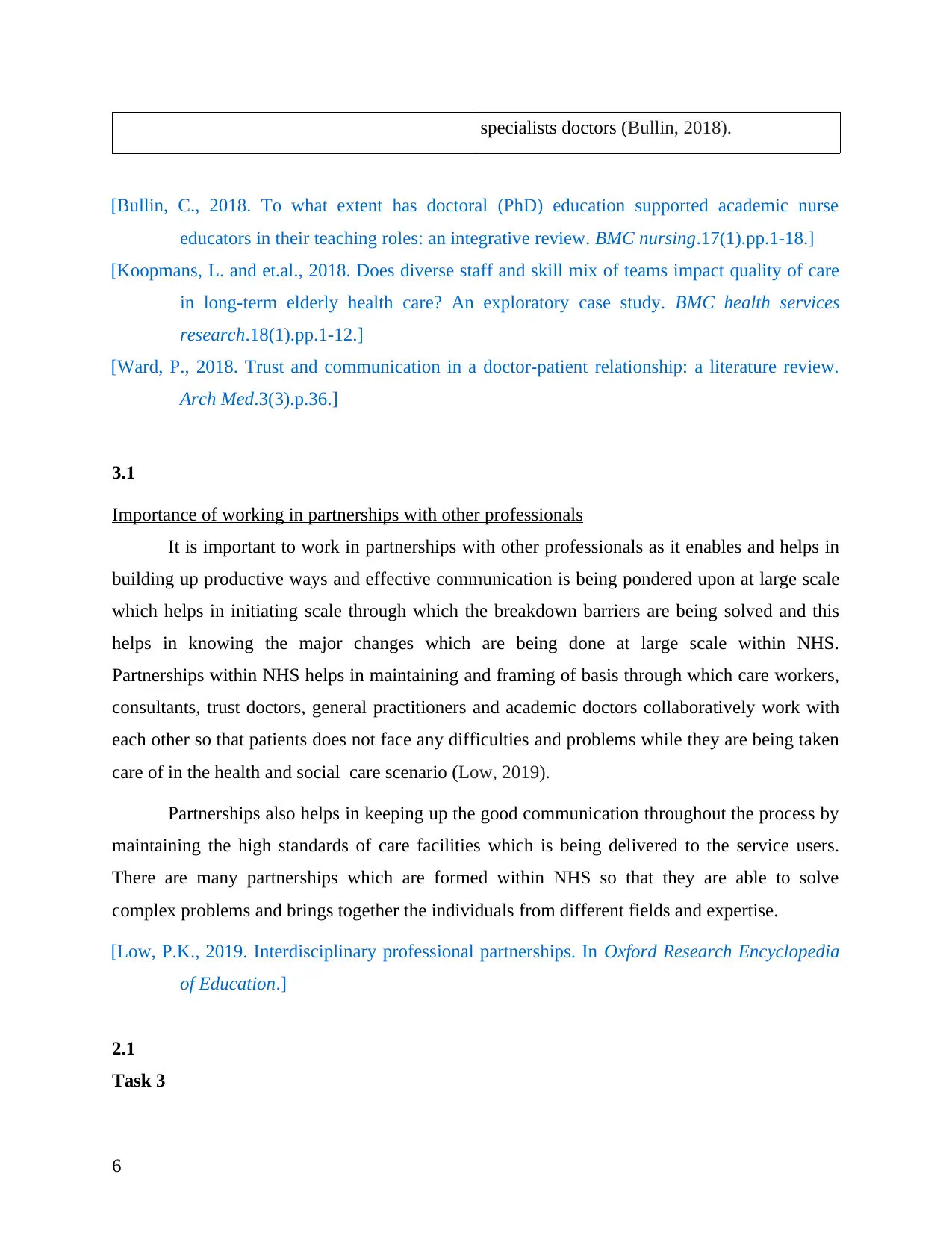
specialists doctors (Bullin, 2018).
[Bullin, C., 2018. To what extent has doctoral (PhD) education supported academic nurse
educators in their teaching roles: an integrative review. BMC nursing.17(1).pp.1-18.]
[Koopmans, L. and et.al., 2018. Does diverse staff and skill mix of teams impact quality of care
in long-term elderly health care? An exploratory case study. BMC health services
research.18(1).pp.1-12.]
[Ward, P., 2018. Trust and communication in a doctor-patient relationship: a literature review.
Arch Med.3(3).p.36.]
3.1
Importance of working in partnerships with other professionals
It is important to work in partnerships with other professionals as it enables and helps in
building up productive ways and effective communication is being pondered upon at large scale
which helps in initiating scale through which the breakdown barriers are being solved and this
helps in knowing the major changes which are being done at large scale within NHS.
Partnerships within NHS helps in maintaining and framing of basis through which care workers,
consultants, trust doctors, general practitioners and academic doctors collaboratively work with
each other so that patients does not face any difficulties and problems while they are being taken
care of in the health and social care scenario (Low, 2019).
Partnerships also helps in keeping up the good communication throughout the process by
maintaining the high standards of care facilities which is being delivered to the service users.
There are many partnerships which are formed within NHS so that they are able to solve
complex problems and brings together the individuals from different fields and expertise.
[Low, P.K., 2019. Interdisciplinary professional partnerships. In Oxford Research Encyclopedia
of Education.]
2.1
Task 3
6
[Bullin, C., 2018. To what extent has doctoral (PhD) education supported academic nurse
educators in their teaching roles: an integrative review. BMC nursing.17(1).pp.1-18.]
[Koopmans, L. and et.al., 2018. Does diverse staff and skill mix of teams impact quality of care
in long-term elderly health care? An exploratory case study. BMC health services
research.18(1).pp.1-12.]
[Ward, P., 2018. Trust and communication in a doctor-patient relationship: a literature review.
Arch Med.3(3).p.36.]
3.1
Importance of working in partnerships with other professionals
It is important to work in partnerships with other professionals as it enables and helps in
building up productive ways and effective communication is being pondered upon at large scale
which helps in initiating scale through which the breakdown barriers are being solved and this
helps in knowing the major changes which are being done at large scale within NHS.
Partnerships within NHS helps in maintaining and framing of basis through which care workers,
consultants, trust doctors, general practitioners and academic doctors collaboratively work with
each other so that patients does not face any difficulties and problems while they are being taken
care of in the health and social care scenario (Low, 2019).
Partnerships also helps in keeping up the good communication throughout the process by
maintaining the high standards of care facilities which is being delivered to the service users.
There are many partnerships which are formed within NHS so that they are able to solve
complex problems and brings together the individuals from different fields and expertise.
[Low, P.K., 2019. Interdisciplinary professional partnerships. In Oxford Research Encyclopedia
of Education.]
2.1
Task 3
6
⊘ This is a preview!⊘
Do you want full access?
Subscribe today to unlock all pages.

Trusted by 1+ million students worldwide
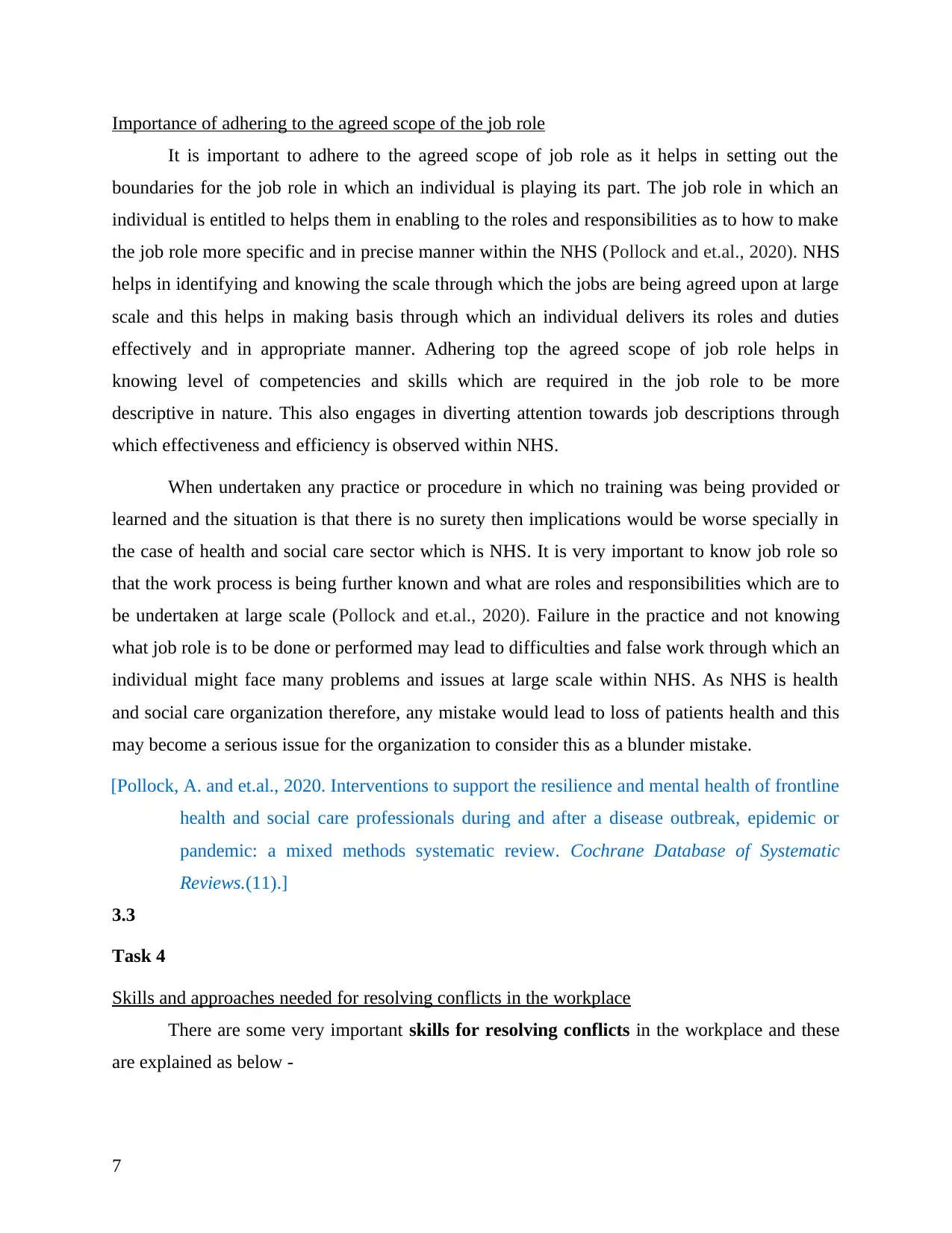
Importance of adhering to the agreed scope of the job role
It is important to adhere to the agreed scope of job role as it helps in setting out the
boundaries for the job role in which an individual is playing its part. The job role in which an
individual is entitled to helps them in enabling to the roles and responsibilities as to how to make
the job role more specific and in precise manner within the NHS (Pollock and et.al., 2020). NHS
helps in identifying and knowing the scale through which the jobs are being agreed upon at large
scale and this helps in making basis through which an individual delivers its roles and duties
effectively and in appropriate manner. Adhering top the agreed scope of job role helps in
knowing level of competencies and skills which are required in the job role to be more
descriptive in nature. This also engages in diverting attention towards job descriptions through
which effectiveness and efficiency is observed within NHS.
When undertaken any practice or procedure in which no training was being provided or
learned and the situation is that there is no surety then implications would be worse specially in
the case of health and social care sector which is NHS. It is very important to know job role so
that the work process is being further known and what are roles and responsibilities which are to
be undertaken at large scale (Pollock and et.al., 2020). Failure in the practice and not knowing
what job role is to be done or performed may lead to difficulties and false work through which an
individual might face many problems and issues at large scale within NHS. As NHS is health
and social care organization therefore, any mistake would lead to loss of patients health and this
may become a serious issue for the organization to consider this as a blunder mistake.
[Pollock, A. and et.al., 2020. Interventions to support the resilience and mental health of frontline
health and social care professionals during and after a disease outbreak, epidemic or
pandemic: a mixed methods systematic review. Cochrane Database of Systematic
Reviews.(11).]
3.3
Task 4
Skills and approaches needed for resolving conflicts in the workplace
There are some very important skills for resolving conflicts in the workplace and these
are explained as below -
7
It is important to adhere to the agreed scope of job role as it helps in setting out the
boundaries for the job role in which an individual is playing its part. The job role in which an
individual is entitled to helps them in enabling to the roles and responsibilities as to how to make
the job role more specific and in precise manner within the NHS (Pollock and et.al., 2020). NHS
helps in identifying and knowing the scale through which the jobs are being agreed upon at large
scale and this helps in making basis through which an individual delivers its roles and duties
effectively and in appropriate manner. Adhering top the agreed scope of job role helps in
knowing level of competencies and skills which are required in the job role to be more
descriptive in nature. This also engages in diverting attention towards job descriptions through
which effectiveness and efficiency is observed within NHS.
When undertaken any practice or procedure in which no training was being provided or
learned and the situation is that there is no surety then implications would be worse specially in
the case of health and social care sector which is NHS. It is very important to know job role so
that the work process is being further known and what are roles and responsibilities which are to
be undertaken at large scale (Pollock and et.al., 2020). Failure in the practice and not knowing
what job role is to be done or performed may lead to difficulties and false work through which an
individual might face many problems and issues at large scale within NHS. As NHS is health
and social care organization therefore, any mistake would lead to loss of patients health and this
may become a serious issue for the organization to consider this as a blunder mistake.
[Pollock, A. and et.al., 2020. Interventions to support the resilience and mental health of frontline
health and social care professionals during and after a disease outbreak, epidemic or
pandemic: a mixed methods systematic review. Cochrane Database of Systematic
Reviews.(11).]
3.3
Task 4
Skills and approaches needed for resolving conflicts in the workplace
There are some very important skills for resolving conflicts in the workplace and these
are explained as below -
7
Paraphrase This Document
Need a fresh take? Get an instant paraphrase of this document with our AI Paraphraser
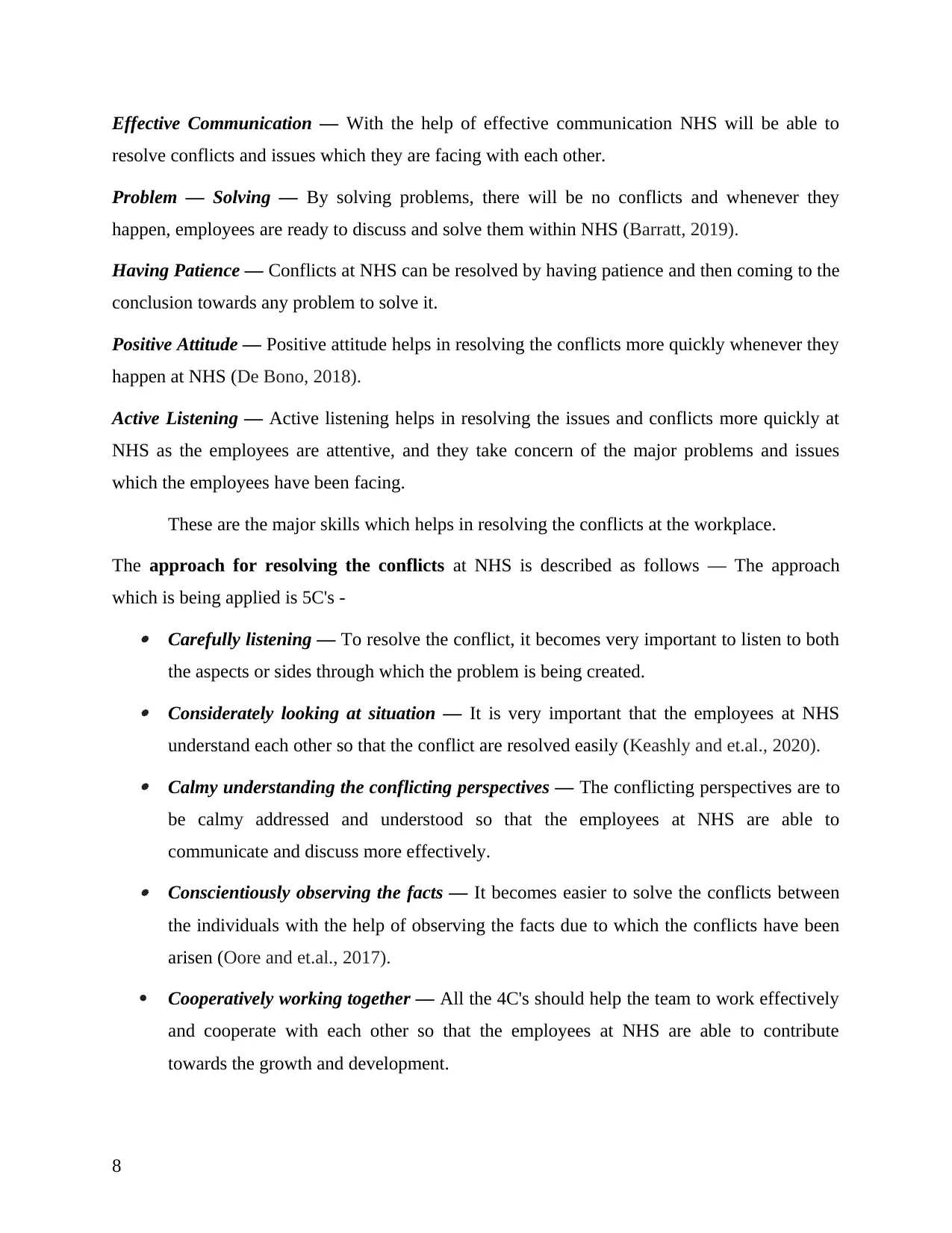
Effective Communication — With the help of effective communication NHS will be able to
resolve conflicts and issues which they are facing with each other.
Problem — Solving — By solving problems, there will be no conflicts and whenever they
happen, employees are ready to discuss and solve them within NHS (Barratt, 2019).
Having Patience — Conflicts at NHS can be resolved by having patience and then coming to the
conclusion towards any problem to solve it.
Positive Attitude — Positive attitude helps in resolving the conflicts more quickly whenever they
happen at NHS (De Bono, 2018).
Active Listening — Active listening helps in resolving the issues and conflicts more quickly at
NHS as the employees are attentive, and they take concern of the major problems and issues
which the employees have been facing.
These are the major skills which helps in resolving the conflicts at the workplace.
The approach for resolving the conflicts at NHS is described as follows — The approach
which is being applied is 5C's - Carefully listening — To resolve the conflict, it becomes very important to listen to both
the aspects or sides through which the problem is being created. Considerately looking at situation — It is very important that the employees at NHS
understand each other so that the conflict are resolved easily (Keashly and et.al., 2020). Calmy understanding the conflicting perspectives — The conflicting perspectives are to
be calmy addressed and understood so that the employees at NHS are able to
communicate and discuss more effectively. Conscientiously observing the facts — It becomes easier to solve the conflicts between
the individuals with the help of observing the facts due to which the conflicts have been
arisen (Oore and et.al., 2017).
Cooperatively working together — All the 4C's should help the team to work effectively
and cooperate with each other so that the employees at NHS are able to contribute
towards the growth and development.
8
resolve conflicts and issues which they are facing with each other.
Problem — Solving — By solving problems, there will be no conflicts and whenever they
happen, employees are ready to discuss and solve them within NHS (Barratt, 2019).
Having Patience — Conflicts at NHS can be resolved by having patience and then coming to the
conclusion towards any problem to solve it.
Positive Attitude — Positive attitude helps in resolving the conflicts more quickly whenever they
happen at NHS (De Bono, 2018).
Active Listening — Active listening helps in resolving the issues and conflicts more quickly at
NHS as the employees are attentive, and they take concern of the major problems and issues
which the employees have been facing.
These are the major skills which helps in resolving the conflicts at the workplace.
The approach for resolving the conflicts at NHS is described as follows — The approach
which is being applied is 5C's - Carefully listening — To resolve the conflict, it becomes very important to listen to both
the aspects or sides through which the problem is being created. Considerately looking at situation — It is very important that the employees at NHS
understand each other so that the conflict are resolved easily (Keashly and et.al., 2020). Calmy understanding the conflicting perspectives — The conflicting perspectives are to
be calmy addressed and understood so that the employees at NHS are able to
communicate and discuss more effectively. Conscientiously observing the facts — It becomes easier to solve the conflicts between
the individuals with the help of observing the facts due to which the conflicts have been
arisen (Oore and et.al., 2017).
Cooperatively working together — All the 4C's should help the team to work effectively
and cooperate with each other so that the employees at NHS are able to contribute
towards the growth and development.
8
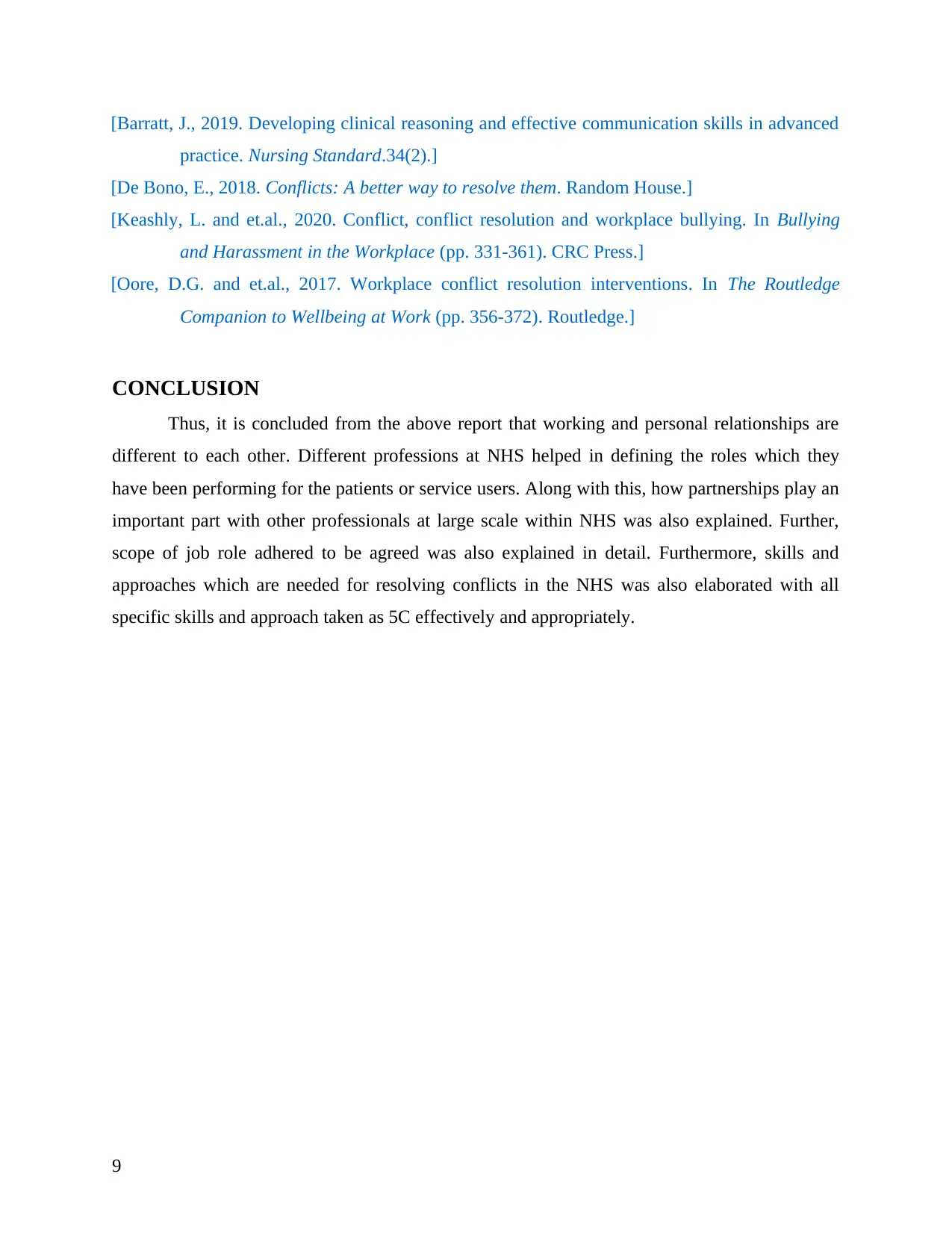
[Barratt, J., 2019. Developing clinical reasoning and effective communication skills in advanced
practice. Nursing Standard.34(2).]
[De Bono, E., 2018. Conflicts: A better way to resolve them. Random House.]
[Keashly, L. and et.al., 2020. Conflict, conflict resolution and workplace bullying. In Bullying
and Harassment in the Workplace (pp. 331-361). CRC Press.]
[Oore, D.G. and et.al., 2017. Workplace conflict resolution interventions. In The Routledge
Companion to Wellbeing at Work (pp. 356-372). Routledge.]
CONCLUSION
Thus, it is concluded from the above report that working and personal relationships are
different to each other. Different professions at NHS helped in defining the roles which they
have been performing for the patients or service users. Along with this, how partnerships play an
important part with other professionals at large scale within NHS was also explained. Further,
scope of job role adhered to be agreed was also explained in detail. Furthermore, skills and
approaches which are needed for resolving conflicts in the NHS was also elaborated with all
specific skills and approach taken as 5C effectively and appropriately.
9
practice. Nursing Standard.34(2).]
[De Bono, E., 2018. Conflicts: A better way to resolve them. Random House.]
[Keashly, L. and et.al., 2020. Conflict, conflict resolution and workplace bullying. In Bullying
and Harassment in the Workplace (pp. 331-361). CRC Press.]
[Oore, D.G. and et.al., 2017. Workplace conflict resolution interventions. In The Routledge
Companion to Wellbeing at Work (pp. 356-372). Routledge.]
CONCLUSION
Thus, it is concluded from the above report that working and personal relationships are
different to each other. Different professions at NHS helped in defining the roles which they
have been performing for the patients or service users. Along with this, how partnerships play an
important part with other professionals at large scale within NHS was also explained. Further,
scope of job role adhered to be agreed was also explained in detail. Furthermore, skills and
approaches which are needed for resolving conflicts in the NHS was also elaborated with all
specific skills and approach taken as 5C effectively and appropriately.
9
⊘ This is a preview!⊘
Do you want full access?
Subscribe today to unlock all pages.

Trusted by 1+ million students worldwide
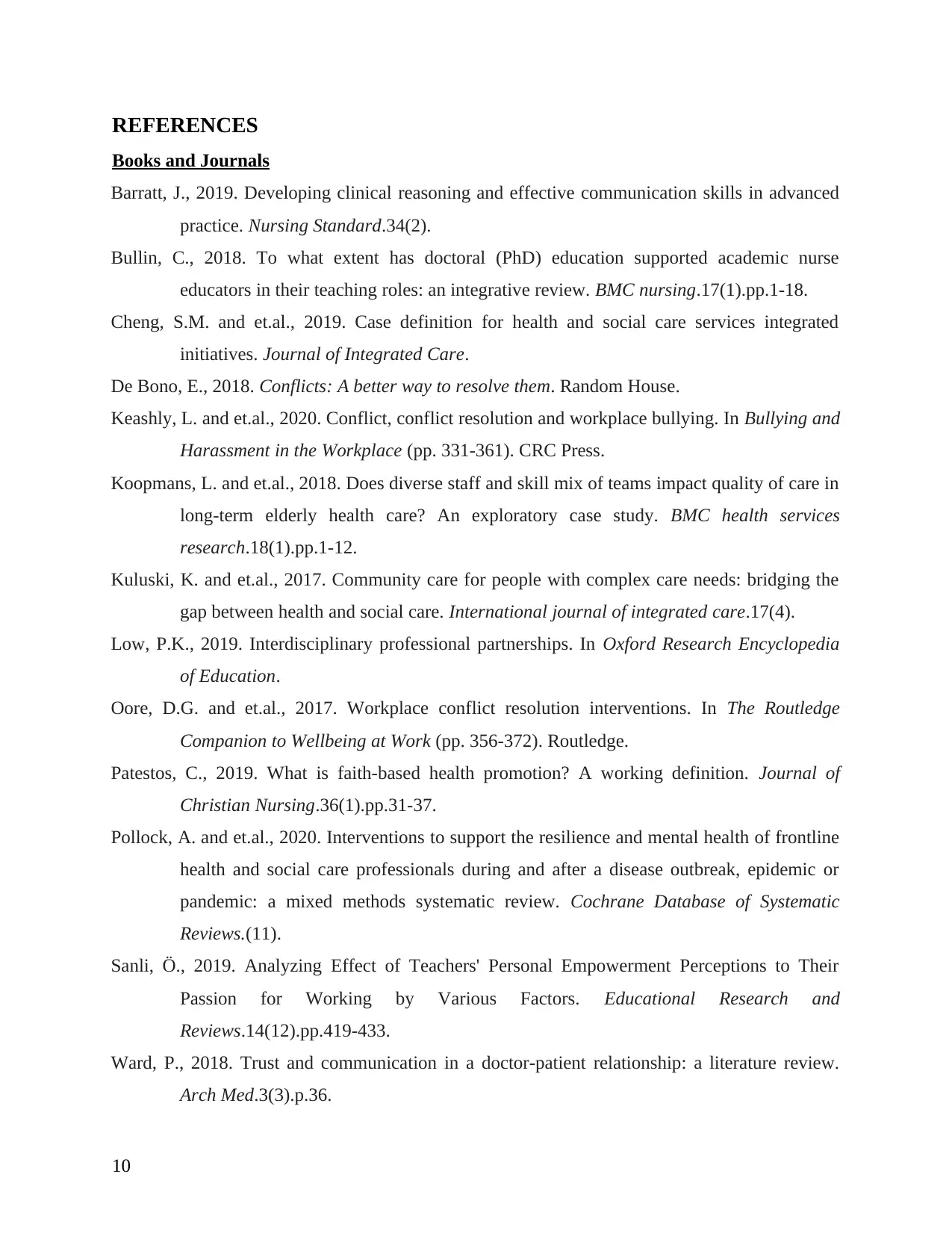
REFERENCES
Books and Journals
Barratt, J., 2019. Developing clinical reasoning and effective communication skills in advanced
practice. Nursing Standard.34(2).
Bullin, C., 2018. To what extent has doctoral (PhD) education supported academic nurse
educators in their teaching roles: an integrative review. BMC nursing.17(1).pp.1-18.
Cheng, S.M. and et.al., 2019. Case definition for health and social care services integrated
initiatives. Journal of Integrated Care.
De Bono, E., 2018. Conflicts: A better way to resolve them. Random House.
Keashly, L. and et.al., 2020. Conflict, conflict resolution and workplace bullying. In Bullying and
Harassment in the Workplace (pp. 331-361). CRC Press.
Koopmans, L. and et.al., 2018. Does diverse staff and skill mix of teams impact quality of care in
long-term elderly health care? An exploratory case study. BMC health services
research.18(1).pp.1-12.
Kuluski, K. and et.al., 2017. Community care for people with complex care needs: bridging the
gap between health and social care. International journal of integrated care.17(4).
Low, P.K., 2019. Interdisciplinary professional partnerships. In Oxford Research Encyclopedia
of Education.
Oore, D.G. and et.al., 2017. Workplace conflict resolution interventions. In The Routledge
Companion to Wellbeing at Work (pp. 356-372). Routledge.
Patestos, C., 2019. What is faith-based health promotion? A working definition. Journal of
Christian Nursing.36(1).pp.31-37.
Pollock, A. and et.al., 2020. Interventions to support the resilience and mental health of frontline
health and social care professionals during and after a disease outbreak, epidemic or
pandemic: a mixed methods systematic review. Cochrane Database of Systematic
Reviews.(11).
Sanli, Ö., 2019. Analyzing Effect of Teachers' Personal Empowerment Perceptions to Their
Passion for Working by Various Factors. Educational Research and
Reviews.14(12).pp.419-433.
Ward, P., 2018. Trust and communication in a doctor-patient relationship: a literature review.
Arch Med.3(3).p.36.
10
Books and Journals
Barratt, J., 2019. Developing clinical reasoning and effective communication skills in advanced
practice. Nursing Standard.34(2).
Bullin, C., 2018. To what extent has doctoral (PhD) education supported academic nurse
educators in their teaching roles: an integrative review. BMC nursing.17(1).pp.1-18.
Cheng, S.M. and et.al., 2019. Case definition for health and social care services integrated
initiatives. Journal of Integrated Care.
De Bono, E., 2018. Conflicts: A better way to resolve them. Random House.
Keashly, L. and et.al., 2020. Conflict, conflict resolution and workplace bullying. In Bullying and
Harassment in the Workplace (pp. 331-361). CRC Press.
Koopmans, L. and et.al., 2018. Does diverse staff and skill mix of teams impact quality of care in
long-term elderly health care? An exploratory case study. BMC health services
research.18(1).pp.1-12.
Kuluski, K. and et.al., 2017. Community care for people with complex care needs: bridging the
gap between health and social care. International journal of integrated care.17(4).
Low, P.K., 2019. Interdisciplinary professional partnerships. In Oxford Research Encyclopedia
of Education.
Oore, D.G. and et.al., 2017. Workplace conflict resolution interventions. In The Routledge
Companion to Wellbeing at Work (pp. 356-372). Routledge.
Patestos, C., 2019. What is faith-based health promotion? A working definition. Journal of
Christian Nursing.36(1).pp.31-37.
Pollock, A. and et.al., 2020. Interventions to support the resilience and mental health of frontline
health and social care professionals during and after a disease outbreak, epidemic or
pandemic: a mixed methods systematic review. Cochrane Database of Systematic
Reviews.(11).
Sanli, Ö., 2019. Analyzing Effect of Teachers' Personal Empowerment Perceptions to Their
Passion for Working by Various Factors. Educational Research and
Reviews.14(12).pp.419-433.
Ward, P., 2018. Trust and communication in a doctor-patient relationship: a literature review.
Arch Med.3(3).p.36.
10
1 out of 10
Related Documents
Your All-in-One AI-Powered Toolkit for Academic Success.
+13062052269
info@desklib.com
Available 24*7 on WhatsApp / Email
![[object Object]](/_next/static/media/star-bottom.7253800d.svg)
Unlock your academic potential
Copyright © 2020–2026 A2Z Services. All Rights Reserved. Developed and managed by ZUCOL.





